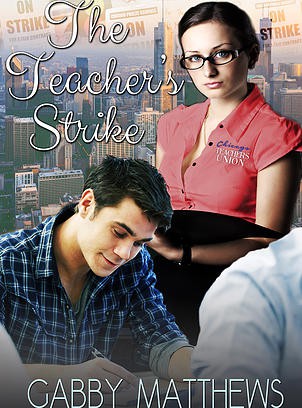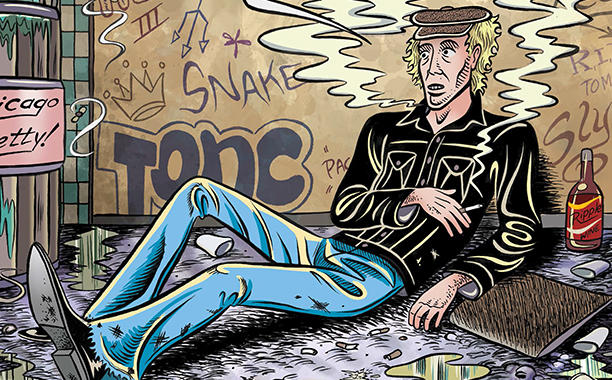Plus: Recovering Attorney Savages Law
“The Chicago Teachers Union is pissed at a Tucson writer – who goes by the pseudonym Gabby Matthews – over a political erotica novel he wrote about a teachers strike that shut down part of Chicago’s public school system for about a week back in 2012,” the Tucson Weekly reports.
“The union has told the author they do not want to be associated with this ‘spanking novel,’ titled The Teacher’s Strike, citing alleged trademark violations, according to the author.
“CTU’s communications director, Stephanie Gadlin, says a fictional Teachers Union logo on a shirt worn by the teacher’s character on the cover should be removed from both print and online copies, because it is way too similar to the union’s actual logo.
“The union also demands that any copies of the book already printed be recalled, a letter from the union’s attorney says.”
*
Geez, CTU, you’re not CPS! Lighten up.
*
“The novel is described as work that ‘takes a sympathetic perspective on the Union’s struggle over educational policy inside Chicago schools. The main and supporting characters take part in the high-profile labor battles against city policies, personified in the book’s unseen antagonist, ‘mayor of the 1 percent,’ the unflattering title used by activists to describe Chicago Mayor Rahm Emanuel . . .
“At one point in the story, the book title’s double meaning becomes clear when the teacher spanks (or ‘strikes’) the student’s bare behind (and vice versa) in a romantic act of affection during intercourse.”
*
Heh-heh.

–
Graphic Chicago
“‘Write what you know’ is an old adage that some authors live by in order to make their stories personal and relevant,” Andrea Towers writes for Entertainment Weekly.
“But as Eisner and Harvey-nominated cartoonist Glenn Head learned in writing his comic memoir Chicago, detailing difficult life experiences can sometimes be more challenging than you expect.
“In Chicago, Head’s graphic memoir, he nakedly airs out his struggles as a teen living on the street, his insecurities, and his transition into adulthood. It’s a blunt take on growing up and finding one’s identity.”
*

–
The Welsh Who Built Chicago
“A Welsh expatriate who has lived in Chicago for more than 40 years has written a book about how Welsh settlers helped build and shape the Windy City during the nineteenth century,” Wales Online reports.
“Dilys Rana, 67, from Flintshire, has spent the last 15 years researching how Welsh settlers who emigrated to Chicago in the 1800s left their mark on one of the biggest cities in the United States.
“She is now preparing to release her historical fiction work, The Welsh Who Built Chicago, by next year.”
–
Recovering Lawyer
“Lynne Raimondo was a lawyer with a major Chicago law firm before she left to write mystery novels,” Margaret Cannon notes for the Toronto Globe and Mail.
“It shows in her slick and often savage portrayal of law in this excellent series featuring Dr. Mark Angelotti, a blind psychiatrist also working for a major Chicago law firm.”
–
Wrong Way To Justice
“Michela Wrong has been writing about Africa for more than 20 years. She came to the subject by accident, relatively early in her career as a foreign correspondent when the news organisation Reuters sent her to cover events in Cote d’Ivoire and Zaire,” Matthew Adams of Abu Dhabi’s The National writes.
Wrong’s experiences in Zaire, now the Democratic Republic of Congo, prompted her to write the first of her three works of non-fiction devoted to the subject of Africa: In the Footsteps of Mr Kurtz (2001), which chronicled the precarious condition of the country as its leadership passed from Mobutu Sese Seko to Laurent Kabila.
This arresting book, which was awarded the PEN James Sterne Prize for non-fiction, was followed by I Didn’t Do It for You (2005), which attended to the vicissitudes of Eritrea under British, American, Ethiopian and Italian occupation; and It’s Our Turn to Eat (2009), which told the story of the Kenyan “whistle-blower” and journalist John Githongo, who in 2002 discovered widespread corruption in the government of Mwai Kibaki.
To these titles Wrong has now added a novel, also concerned with Africa. Borderlines, her first work of fiction, has at its heart a territory dispute between the countries Darrar and North Darrar.
We are introduced to this story through the figure of Paula Shackleton, a British national working in America as a corporate lawyer, who is struggling to come to terms with the death of her great love, Jake Wentworth. Now, in 2004 and after Jake’s death, she feels she has been living an etiolated existence, a “botched, interrupted, pointless demi-life.”
It is in this condition that she encounters Winston Peabody, also a lawyer. Winston has made a good living advising US corporations on foreign investments; yet he is also a celebrity in the world of human rights, an individual with a natural affinity for the downtrodden, the weak, the vulnerable (“Underdogs, that’s my thing. Takes one to know one.”).
Winston and Paula are both staying at the Langham hotel, Chicago, to conduct business; and when Winston notices Paula one day at breakfast, he invites her to attend a talk he is giving on human rights, and later offers her a job: would she like to help him represent the government of North Darrar, a country that is negotiating its borderlines at The Hague, and effectively attempting to prove its right to exist?
*
Whistleblower On A Crusade For The Truth.
–
Comments welcome.
Posted on August 13, 2015


